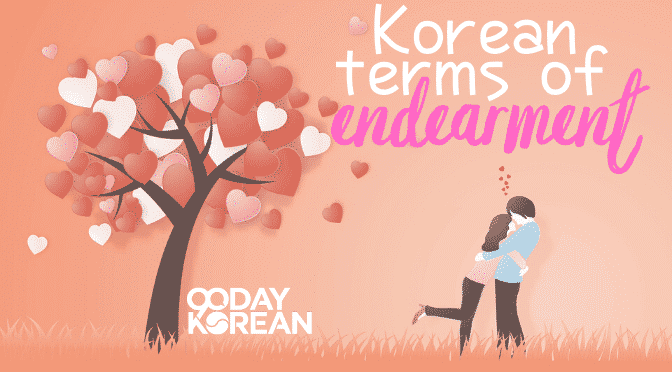Do you know the Korean terms of endearment for your loved one? In Korea, it’s quite common for people to use words like “honey” and “babe” to refer to their significant other rather than using their name.
Here is a list of the most common Korean terms of endearment you can use for the one you love.
- Jagiya (자기야) – “Honey” or “Baby”
- Nae sarang (내 사랑) – “My Love”
- Yeobo (여보) – “Honey” or “Darling”
- Aein (애인) – “Sweetheart”
- Aegiya (애기야) – “Baby”
- Naekkeo (내꺼) – “Mine” or “My Sweetheart”
- Gongjunim (공주님) – “Princess”
- Wangjanim (왕자님) – “Prince”
- Oppa (오빠) – “Older Brother” (from younger female)
- Seobangnim (서방님) – “Husband”
If you’re learning Korean, married to a Korean, or just want to talk cute to your boyfriend or girlfriend, then you’ll want to know these Korean terms of endearment. Read on to get example sentences for each of the romantic terms, as well as audio to practice your speaking.
Do you want a downloadable list of these romantic terms? We have a free PDF resource for you here:
All of the Korean terms of endearment below will be in Hangeul (Korean Alphabet) with romanized Korean next to it. We recommend learning the Korean alphabet so you can learn these terms faster and have accurate pronunciation.
Being able to read the Korean alphabet will help you retain the core Korean words you should learn first. It will also improve your overall Korean language learning plan.
Contents
- 1 Korean Words of Endearment
- 1.1 1. Jagiya (자기야) – “Honey” or “Baby”
- 1.2 2. Nae sarang (내 사랑) – “My Love”
- 1.3 3. Yeobo (여보) – “Honey” or “Darling”
- 1.4 4. Aein (애인) – “Sweetheart”
- 1.5 5. Aegiya (애기야) – “Baby”
- 1.6 6. Naekkeo (내꺼) – “Mine” or “My Sweetheart”
- 1.7 7. Gongjunim (공주님) – “Princess”
- 1.8 8. Wangjanim (왕자님) – “Prince”
- 1.9 9. Oppa (오빠) – “Older Brother” (from younger female)
- 1.10 10. Seobangnim (서방님) – “Husband”
- 1.11 11. [name] + 엄마 (eomma) – “[name]’s mother”
- 1.12 12. [name] + 아빠 (appa) – “[name]’s father”
- 2 Other Korean Pet Names for Lovers
- 3 How to talk about your partner with others
- 4 What do you call your boyfriend in Korean?
- 5 What do you call your Korean girlfriend?
- 6 Korean Nicknames
- 7 Wrap Up
Korean Words of Endearment
Earlier, we gave you a quick list of the common Korean terms of endearment you can use for calling someone special to you or your better half. This time, we’ll be digging deeper into these terms of endearment. These terms of endearment can sound familiar to you as these are the languages you’ll commonly hear in romantic Korean dramas.
Below, we’ll discuss how each of the Korean words or terms can be used, and we’ll also give examples.
1. – “Honey” or “Baby”
Perhaps the most popular of the Korean terms of love between couples it means “honey,” “darling,” or “baby,” which you’ll often hear among couples in K-dramas. You can also just shorten it to 자기 (jagi). Use this term along with Korean love phrases. It’s used for both men and women.
Example Sentences:
자기야, 사랑해. (jagiya, saranghae.)
I love you, darling.
미안해, 자기야. 용서해줘. (mianhae, jagiya. yongseohaejwo.)
I’m sorry, darling. Forgive me.
2. – “My Love”
This term of endearment can directly be translated as “my love.” It is similar to 자기야 (jagiya) in how couples use it. This term is used with both males and females.
Example Sentences:
잘 가요, 내 사랑. (jal gayo, nae sarang)
Goodbye, my love.
그는 하나뿐인 내 사랑이에요. (geuneun hanappunin nae sarangieyo.)
He is my only love.
3. – “Honey” or “Darling”
This translates as “honey” or “darling.” It is used exclusively between married couples. You may have heard of this term from a husband or wife in Korean dramas. This term can be used for both men and women.
Example Sentences:
여보, 생일 축하해. (yeobo, saengnil chukahae)
Happy birthday, honey.
여보, 괜찮아? (yeobo, gwaenchana?)
Are you okay, honey?
4. – “Sweetheart”
“Sweetheart” is the closest translation for this term of endearment. 애인 (ae in | sweetheart) is gender-neutral. This means anyone can use 애인 (ae in | sweetheart) with their partner or when referring to someone’s partner.
Example Sentences:
애인 있어요? (aein isseoyo?)
Do you have a sweetheart?
애인 없어요. (aein eopseoyo.)
I don’t have a sweetheart.
나는 애인을 기다려요. (naneun aeineul gidaryeoyo)
I’m waiting for my sweetheart.
나는 애인하고 여행해요. → (naneun aeinhago yeohaenghaeyo)
I travel with my lover.
5. – “Baby”
The word 애기 (aegi) is a cute way of saying 아기 (agi), which means “baby. This Korean term is used as a sweet way of saying “baby”.
Example Sentences:
애기야 뭐 먹을까? (aegiya mwo meogeulkka?)
What shall we eat, baby?
아이구 우리 애기~ (aigu uri aegi~)
Oh my god, my baby ~
If you’re planning to move or visit your Korean partner’s family in Korea and want to know more about Korean culture, you can check our full guide here.
6. – “Mine” or “My Sweetheart”
You could translate this term of love as “mine” or “my sweetheart.” It’s an extra cute way of talking. You can also use 이름 + 꺼 (name + kkeo), meaning “mine”.
Example Sentences:
내꺼~ 지금 어디에요? (naekkeo~ jigeum eodieyo?)
My (sweetheart), where are you now?
우리 남친 누구꺼? 내꺼! (uri namchin nugukkeo? naekkeo!)
My boyfriend, whose boyfriend are you? Mine!
7. – “Princess”
“Princess” is a term of endearment a man can use when speaking with his girlfriend. The word 공주(gongju) means princess, and the 님 (nim) part is a formal title. It’s similar to referring to your girlfriend as if she’s royalty.
Example Sentences:
우리 공주님을 위해서라면 무엇이든. (uri gongjunimeul wihaeseoramyeon mueosideun)
Anything for my princess.
오늘따라 예뻐 보여요 공주님. (oneulttara yeppeo boyeoyo gongjunim)
You look pretty today, princess.
8. – “Prince”
Like princess for women, “prince” or “prince charming” is what some girls and women may use with their boyfriends. The 님 (nim) suffix is used as a title of respect. Even if the couple talks formally to each other, the 님 (nim) suffix makes the term seem more kind and caring.
Example Sentences:
당신은 나의 왕자님이에요. (dangsineun naui wangjanimieyo)
You are my prince.
우리 왕자님, 너무 멋져 보여요. (uri wangjanim, neomu meotjyeo boyeoyo)
You look so cool, my prince.
9. – “Older Brother” (from younger female)
Although the literal translation for this word is “brother”, it has deeper meaning. 오빠 (oppa) is also a common term for girls and women to use with their boyfriends and husbands. The term 오빠 (oppa) is used both directly with your partner and when talking about him to others.
When saying this term, be sure to add in some aegyo for additional cuteness!
Example Sentences:
오빠가 있어서 든든해. (oppaga isseoseo deundeunhae.)
I feel safe/secure to have you.
오빠가 보고 싶어요. (oppaga bogo sipeoyo.)
10. – “Husband”
Or 서방 (seobang), more informally, this term simply translates as “husband”. It’s a common term used in the world of married couples. It has deep historical roots in Korean, although you’ll perhaps hear it more for sons-in-law than husbands in modern-day Korea.
Example Sentences:
서방님, 집에 일찍 들어오세요. (seobangnim, jibe iljjik deureooseyo.)
(Husband) Please come home early.
서방님, 식사하세요. (seobangnim, siksahaseyo.)
(Husband) Please eat, your meal is ready.
11. [name] + – “[name]’s mother”
Once a couple has kids, they occasionally start addressing each other as their child’s mom or dad. You should use the name of the child in place of the [name]. It’s meant to be a bit cute but also practical. These terms of endearment could also be used by people outside of the immediate family.
Example Sentence:
영수 엄마는 선생님이에요. (yeongsu eommaneun seonsaengnimieyo.)
Youngsoo’s mom is a teacher.
12. [name] + – “[name]’s father”
This is the same as the term for mom, except it is used to refer to fathers.
Example Sentence:
지수 아빠는 소방관이에요. (jisu appaneun sobanggwanieyo.)
Jisoo’s dad is a firefighter.
If you want to learn how to build your own Korean sentences with these terms, our resource on Korean sentence structure can help you with that.
Other Korean Pet Names for Lovers
On top of the popular terms of endearment listed above, here are more pet names that you can use to address your significant other.
“My love” in Korean
The phrase “my love” in Korean can be expressed as 내 사랑 (nae sarang). You can use this as a term of endearment to your significant other.
This phrase is made up of 2 Korean words: 내 (nae) and 사랑 (sarang). 내 means “my” and 사랑 (sarang) means “love.”
“Baby” in Korean
There are a few ways to say “baby” in Korean. You can say 아기 (a-gi) for the word “baby.” This word can also be used when referring to baby animals.
애기 (aegi) is another word you can use for “baby.” This is a cute way to express the word.
아가 (aga), on the other hand, is also a word for baby. However, this is usually used when you’re calling the baby’s attention.
베이비 (be-i-bi) is also a word used for the word “baby” in Korean.
“Darling” in Korean
The word “darling” in Korean can be expressed in a number of ways. You can call your significant other “darling” with 여보 (yeobo) or 자기 (jagi).
For example:
여보, 무슨 일이에요? (yeobo, museun irieyo?)
What’s the matter, darling?
걱정하지 마, 자기. (geokjeonghaji ma, jagi.)
Don’t worry, darling.
You can also use 사랑하는 (saranghaneun) to call someone special as darling.
For example:
내 사랑하는 딸. (nae saranghaneun ttal.)
My darling daughter.
나의 사랑하는 사람. (naui saranghaneun saram.)
My little darling.
“Sweetheart” in Korean
There are two words you can use to express sweetheart in Korean. The first word is 애인 (aein) and the second word is 연인 (yeonin).
Both 애인 (aein) and 연인 (yeonin) can also be used for “lover.”
For example:
얼마전에 애인이 생겼어요. (eolmajeone aeini saenggyeosseoyo.)
I just got a lover/sweetheart.
우리는 연인 사이다. (urineun yeonin saida.)
We are lovers/sweethearts.
“Girlfriend” in Korean
Girlfriend in Korean is 여자 친구 (yeoja chingu). You can learn more about this word in the article “How to Say “Girlfriend” in Korean”
“Boyfriend” in Korean
Boyfriend in Korean is 남자 친구 (namja chingu). You can read the article “How to Say ‘Boyfriend’ in Korean” to learn more about this word.
How to talk about your partner with others
You wouldn’t use most of the above terms of endearment when talking about your partner. Instead, you’d simply call them “husband” (남편| nampyeon), “wife” (아내 | anae / 와이프 | waipeu), “boyfriend” (남친 | namchin) and “girlfriend” (여친 | yeochin).
What do you call your boyfriend in Korean?
This is really a personal call, so you might want to try calling him a few names with your boyfriend to see what he likes. Some potential names or Korean words you’d like to use are 왕자님 (wangjanim)”, 오빠 (oppa), 자기야 (jagiya), 내 사랑 (nae sarang), or 여보 (yeobo). Alternatively, you can come up with your own cute Korean nickname if you prefer calling him pet names like baby boo, honey bunny, papa bear, or even boo bear!
What do you call your Korean girlfriend?
Just like with your lover boy Korean boyfriend, you’ll also want to try calling your Korean girlfriend by different cute nicknames to see how she reacts. You might have already tried sugar pie, honey bun, cutie pie, or gummy bear. Some possible names are 내 사랑 (nae sarang), 여보 (yeobo), 자기야 (jagiya), 공주님 (gonjunim), or 내꺼 (naekkeo). Give them a try and see which one she likes best.
Korean Nicknames
There are several common Korean nicknames commonly used in South Korea that you can also use for your spouse or significant other. There are cute, cool, unique, and creative Korean nicknames you can use.
Some of them are listed below:
- 해바라기 (haebaragi) – sunflower
- 나비 (nabi) – butterfly
- 하루 (haru) – a day
- 애라 (aera) – love
Cute Korean nicknames
For cute nicknames that you want to address your significant other with, some popular nicknames are 자기야 (jagiya), 내 사랑 (nae sarang), 여보 (yeobo), and 애기야 (aegiya). You can also come up with your own nickname based on experiences you have with your special someone or combine them with nicknames like lovey-dovey, love bug, or cutie patootie.
If you liked these Korean nicknames, you might want to check out our page on Korean love phrases. It’s a great companion to use with the words you learned here. We also have a structured online Korean course that will teach you how to hold a 3-minute Korean conversation with your loved ones in the first 90 days.
One fantastic reason for learning Korean is that you can impress your significant other by calling them by these Korean terms of endearment. It’s a wonderful way to feel even closer to that special someone.
Wrap Up
Now that you’ve learned these Korean terms of endearment, you can shine by showing your significant other what you know! Listen to these Korean terms of endearment in Korean movies and dramas, and you may find yourself relying less and less on subtitles.
Let us know in the comments which of these Korean nicknames you’ll be the most excited to use!






Is there a way to call your husband ‘my heart’ instead of ‘my love’ ? I’ve used the Google translate but I know sometimes that isn’t the correct usage term
Hi Dirnali! Korean translation for ‘my heart’ is ‘내 마음’ and this isn’t used as a term of endearment like in English. However, there are terms like ‘자기’, and ‘여보’ that can be used to call one’s husband or wife. ^^
Hii, thank you so much
You’re welcome, Mannat! ^^
Is there any different term for someone you are engaged to but not yet married to? Like if I were to introduce or talk about my fiancé to someone, would I still call them just 남자친구?
Hello Kat, you can use 약혼자 which means ‘a fiancé, a fiancée.’ e.g. 이 사람이 제 약혼자입니다 =This is my fiancé